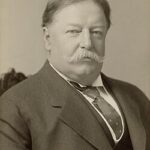The Payne-Aldrich Tariff Act Decision
President William Howard Taft faced enormous pressure in 1909 to fulfill campaign promises. He had pledged significant tariff reductions during the 1908 election. Progressive Republicans expected him to lower protective barriers hurting consumers. Instead, Taft signed the Payne-Aldrich Tariff Act on August 5, 1909. 📊 The legislation reduced average tariff rates from 46% to 41%. However, it maintained high protections for major industries like steel and textiles.
Why Progressives Felt Betrayed
The Payne-Aldrich Tariff Act fell far short of reform expectations. House Speaker Joseph Cannon and Senator Nelson Aldrich influenced the final bill. They represented conservative Republican interests favoring high tariffs. Taft publicly defended the legislation as “the best tariff bill” ever passed. 💰 This statement infuriated progressive leaders like Robert La Follette. They accused Taft of abandoning working-class Americans for corporate interests.
Political Calculations Behind the Compromise
Taft believed modest reforms were politically realistic in 1909. Conservative Republicans controlled key congressional positions. ⚠️ The President feared radical changes might damage the economy. He chose incremental progress over confrontational reform battles. This decision would prove catastrophic for Republican Party unity.
Impact:
Republican Party Split
The Payne-Aldrich Tariff Act created an irreparable rift within Republican ranks. Progressive Republicans like Theodore Roosevelt felt deeply betrayed by Taft’s compromise. 🔥 The decision sparked the formation of insurgent Republican factions. These groups would later challenge Taft’s renomination in 1912. Conservative Republicans maintained their influence over economic policy. However, they lost credibility with reform-minded voters nationwide.
Economic Consequences for Consumers
High tariffs continued burdening American families with increased costs. 📉 Consumer goods remained expensive due to reduced foreign competition. Small businesses struggled against protected monopolistic practices. Agricultural interests faced retaliatory tariffs from foreign nations. The act failed to stimulate meaningful economic competition. Working-class Americans saw little benefit from the modest reductions implemented.
Long-term Political Transformation
Taft’s tariff decision fundamentally altered American political dynamics permanently. The 1912 election saw Republicans split between Taft and Roosevelt. 🌍 This division allowed Democrat Woodrow Wilson to win the presidency. Progressive Republicans eventually joined the Bull Moose Party movement. The incident demonstrated the growing power of reform movements. Conservative Republican dominance began declining after this controversial decision. Future presidents would face similar pressure between reform promises and political reality.
